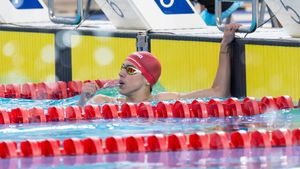Kyoto Racecourse faced significant disruptions due to heavy snow on February 8, leading the Japan Racing Association (JRA) to announce the cancellation of the day’s races. This move, labeled as necessary for safety, was prompted by 7 cm of snow on turf and 3 cm on the dirt tracks, posing unacceptable risks for both horses and jockeys.
According to JRA, the weather conditions were assessed early on the morning of the event. The cancellation was made official at 6 AM, as snow continued to fall, with forecasts predicting similar conditions throughout the day. The decision reflects JRA's priority on safety, aiming to avert any potential accidents resulting from slippery surfaces.
This marked the first weather-related cancellation due to snowfall since January 15, 2017, when the same racecourse also closed its gates to protect participants. Such postponements are not unprecedented—February races frequently feel the impact of winter's harshness, with notable weather disruptions recorded over the past decade.
To mitigate the inconvenience caused to participants and fans alike, JRA quickly arranged for replacement races on February 10, ensuring there would be no alterations to entries or horse numbers. "We have scheduled a replacement race on February 10 without changing the entries and horse numbers," said JRA officials.
Specific preparations included evaluating the track conditions, with JRA staff diligently clearing snow from the course. By the afternoon, the weather began to improve, leading to hopes for favorable racing conditions by the weekend.
The repercussions from these cancellations extend to jockeys and trainers scheduled to compete. Many had anticipated resuming their roles after prior suspensions or injuries. Notably, renowned jockey Yuichi Fukunaga was slated to return to action, but now his plans have been postponed.
The historic significance of these cancellations can’t be ignored. JRA's decision echoes similar past incidents reflecting their commitment to the high standards of horse racing, signifying just how much weather can impact both humans and animals involved.
Looking back, the last accumulation of snow leading to the cancellation of races occurred more than six years ago, illustrating the rarity of this situation but also the changing climate patterns affecting thoroughbred events across Japan.
Forecasters predict clearer skies for subsequent days, bringing cautious optimism for jockeys, trainers, and fans alike. While February's weather can still be unpredictable, local residents and racing enthusiasts are hopeful for improved conditions going forward.
Despite this hiccup, the upcoming replacement races aim to not only make up for lost time but also serve as reminders of the resilience found within the world of competitive racing. The community eagerly anticipates resuming competition, showcasing the bond between trainers, riders, and their equine partners on the track.
For now, the JRA will continue to monitor conditions as they evolve, staying prepared to adapt as necessary. The focus remains squarely on maintaining the highest safety standards to uphold the integrity of the sport, no matter the weather.



